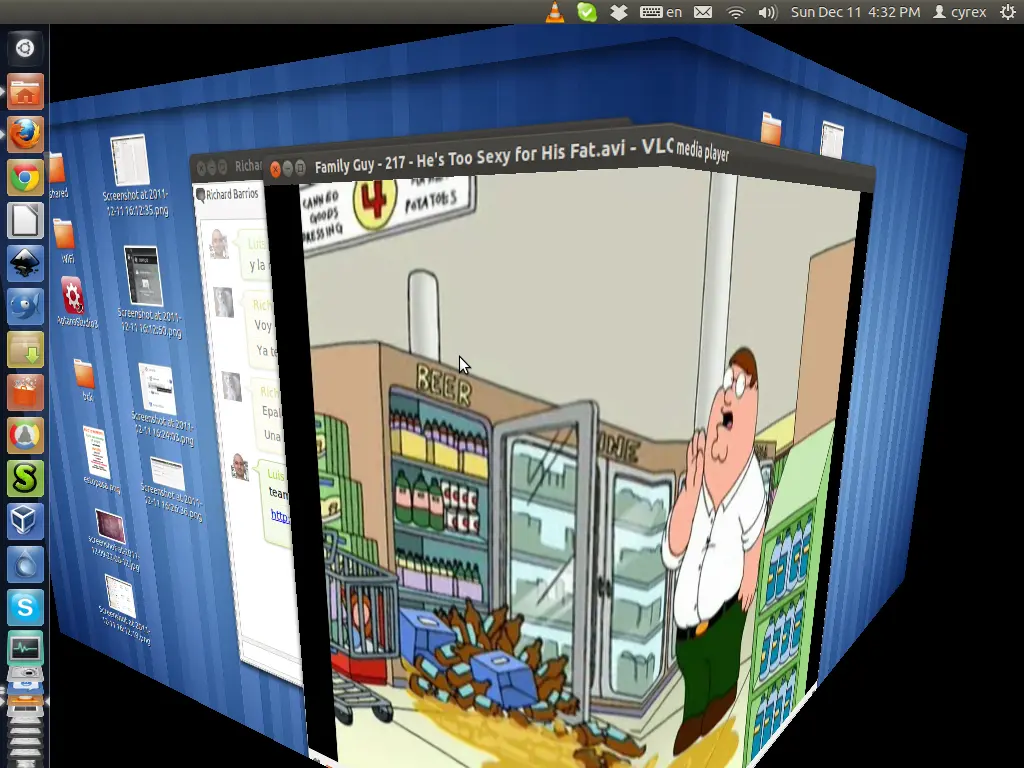Notice how none of these replies are “AI assistant”?
“AI assistant” just seems like a euphemism for “increased tracking”.
deleted by creator
Imagine a standardized API where you provide either your own LLM running locally, your own LLM running in your server (for enthusiasts or companies), or a 3rd party LLM service over the Internet, for your optional AI assistant that you can easily disable.
Regardless of your DE, you could choose if you want an AI assistant and where you want the model to run.
I’ve had this idea for a long time now, but I don’t know shit about LLMs. GPT can be run locally though, so I guess only the API part is needed.
I’ve run LLMs locally before, it’s the unified API for digital assistants that would be interesting to me. Then we’d just need an easy way to acquire LLMs that laymen could use, but probably any bigger DE or distro can create a setup wizard.
Check out koboldAI and koboldassistabt projects. That’s Litterally the thing you are describing and is Open source
deleted by creator
Yeah. I’m really annoyed by this trend of having programs that could function offline require connecting to a server.
deleted by creator
Not just hypothetically but practically too. A foss program called koboldai let’s you run LLMs locally on your computer and a project that takes advantage of this is the koboldassistant project. You can essentially make your own Alexa,Cortana,Siri whatever that doesn’t collect your data and belongs to you
Open source locally run LLM that runs on GPU or dedicated PCIe open hardware that doesn’t touch the cloud…
To be fair - people don’t know what they want until they get it. In 2005 people would’ve asked for faster flip phones, not smartphones.
I don’t have much faith in current gen AI assistants actually being useful though, but the fact that no one has asked for it doesn’t necessarily mean much.
To be fair, in 2005 a lot of people dreamed of “mini portable computers that could fit in their hands”. They just didn’t associate it to the form created with smartphones, and when the smartphones came to be, people were amazed by it. I don’t see the same level of reception when it comes to AI assistants.
faster flip phones
I don’t think speed was a complaint anyone had about phones right before smartphones launched.
People were mostly concerned with cell phone plans. Talking used to be charged by the minute, texting was charged per text, and data was practically non-existent.
Cell phones have come a long way, but I think a lot of people take for granted just how much cell service has improved. I pay $25/month for a single line that gives me unlimited talk, text, and data (Visible). Couldn’t be happier.
I pay $25/month for a single line that gives me unlimited talk, text, and data (Visible). Couldn’t be happier.
cries in Canadian
What if it’s a friendly purple gorilla
Would be a cool feature if it could be leveraged in a secure, private, efficient way that was more useful than 99% of the algorithmic monkey typewriter garbage that’s on the market these days. I don’t need a glorified Cleverbot rifling through my unspeakables.
Local LLMs are getting better at a very rapid pace. Still a bit too resource hungry to have running in the background all the time, but for example Mistral-7b is quite competent for its size.
deleted by creator
HDR
Its current work in progress from different companies and groups working together (Gnome, Kde, RedHat, Valve, etc)
immediately thought of that too
what’s HDR?
High Dynamic Range. Compatible software, computer and monitor can display a greater range of brightnesses.
That’s Display Server level, DE is 2 levels higher. HDR in a DE sounds like a pain. You know, that flashing problem with the phone in the night?
deleted by creator
Flashing problem?
Too bright in the dark.
That’s why your phone has a brightness slider, or better yet an ambient light sensor that automatically adjusts brightness. DE will need something similar.
Why does everyone like it so much?
I’d tell you… if I had it!
I think it’s one of those things like freesync, high DPI and high refresh rates that you really have to see for yourself.
Is that why games always look better on Linux than on Windows?
High-DPI I just don’t understand. I tried. Yeah, it’s pretty, but that’s all it is for me. More content on screen > sharper text for me, thank you.
Higher refresh rates and VRR are pretty neat though. Just at 75Hz I already feel the difference pretty clearly when I go back to my 60Hz laptop.
Would be great for the tv screen with 4k and hdr that I have around for example.
It’s pretty great for media consumption and gaming, with the right hardware. Otherwise it kind of blows.
A more polished wayland with plasma 6 :)
Definitely. It improved recently (like 2 last versions) and was a big thing when the fractional support was added, since now some software can finally be usable. But I still have too many problems regarding speed, animations, different sizes of things in different places, mouse cursors being wrong, crashes or lock ups sometimes happen, etc.
But it’s getting there and am really hopeful for next version and how good it could be.
Really want to finally be able to properly use my external monitor with the laptop monitor also connected at different sizes and fractional settings.
It’s interesting nowadays. My windows 11 navigation bar on my work computer now crashes 10x as much as plasma Wayland does. Completely reverse of years earlier.
Along with dozens of other problems like invisibly disabling the microphones so the only way to unmute them is to use the audio troubleshooter, my windows laptop gets more unstable with every update while KDE Wayland gets more stable with every update.
and was a big thing when the fractional support was added
I don’t get the need for fractional scaling. If you had bought nonsensical hw like a 4k screen in a 15" notebook, just change display resolution and maybe global font size?
And waste all those pixels? Scaling let’s you keep the sharpness while also getting reasonably sized ui
More sharpness than you have pixels?
edit: You didn’t like the question?
I didn’t downvote you
The way I parsed your earlier comment was that the solution to making a resolution like 4k usable on a laptop was just to lower your resolution. My point is that if instead of lowering your resolution, meaning you’re not utilizing the full potential of your screen, you can instead use UI scaling to make the resolution usable while still benefiting from the higher resolution in terms of sharpness in text, games etc.
A bunch of ai garbage and also some ads please! Maybe collect info about me and sell it to marketing corporations while you’re there.
I want the cube back.

KDE still has it
Yes, along with wobbly and exploding windows!
Here it is. https://github.com/Schneegans/Desktop-Cube
It never left, you can still use Compiz!
The what

Nice
I don’t think it ever left
But but Compiz and burning windows and cube… The times are not the same.
Here it goes. The cube one was posted above. https://github.com/Schneegans/Burn-My-Windows
There’s wayfire
Basically competent support for hardware for laptops newer than 2014. Proper thunderbolt, displaylink, trackpad, fingerprint reader, facial rec support.
tbf more often than not displaylink just sucks, no matter the OS.
My company insists on buying these shitty Dell DisplayLink docking stations. They suck so hard they are just a stupid expensive 90W charger. Even OS X users hate them. The frustrating thing is, these things were supposed to allow us to plug our laptop in anywhere and get two working screens, keyboard and charging. The only bit that works reliably is the keyboard and mouse.
There is a driver for it, but it bricks my OpenSuSE and stresses the CPU so much on OS X that it’s literally unusable.
I wonder why Displaylink still gets used when DP alt mode has existed for many years now.
We used Dell WD19 docks and they worked well enough. A bit buggy sometimes but a firmware update usually fixed it.
deleted by creator
Yes however on windows and mac displaylink “sucks” on linux it is practically unusable. I do agree Dlink sucks, but modern laptops have no alternatives to speak of.
Really? I find displaylink awesome I alternatively use ChromeOS, Linux and windows with no issues even gameing on windows (lowers the FPS but fine for my abilities)
Curious what HW you are using I have a couple of different Dell DL models
Linux on displaylink was iffy but it has been great the last few years.
That’s fair.
I’m glad I don’t rely on any of that, personally. Aside from the trackpad, which works as it should.
trackpads work fine on Wayland or wirh xinput2
I wish Wayland had support for multi-finger gestures. I know my System76 laptop’s trackpad supports them on Windows, but Windows is trash. I use them all the time on my Mac, but I just use a mouse on Linux.
wdym, gnome and kde have 1:1 3/4 finger gestures and smooth scrolling OOTB.
And it works GREAT!! much better then on win10!
ONLY under Wayland though…
if you’re using x11, you won’t get the gestures.I’m using the latest Plasma on Wayland on Arch and NONE of those gestures work!!
I am NOT using x11!!
something must be broken then.
thy work perfectly on both my 8 year old asus laptop and a new dell model from 2021I have a System76 Kudu from 2018. I won’t buy anything from them again, honestly. It was overpriced for what it was, and the screen is awful. And it still has features that only work on Windows 10. Not at all what I expected from a company that claims to be Linux-first.
afaik tuxedo laptops are great… but I don’t own any (and don’t need a new laptop rn) so idk
also maybe you need a legacy driver for your touchpad like xf86 synaptics
You want open firmware, so this is not a DE problem.
A consistent system settings app that actually handles all configs without requireing manual editing of config files.
Which DE? With KDE I don’t think I’ve ever had to edit a config file. I do recall that being an issue with Gnome; it’s been years since I’ve used it though.
XFCE is really bad with this. KDE is much better, but still when setting up something a bit more complicated, you are quickly back to reading man pages. And man pages really aren’t great.
On KDE, if you want NumLock to start on at the login screen, you need to edit a file.
Also, to remap mouse side buttons, you need to either mess with a config file or install something like Input Remapper.
Neither of these things are true, if you’re using Wayland for both sddm and the session
Remote desktop working like it does in windows.
- easy to setup and use
- can remote into a system that has been recently rebooted. Without needing to make the user auto login and set the keychain password to be blank.
- resolution scales to remote client interface
I love linux and it is really all I use but RDP support is severly worse than windows.
What do you need RDP for? I did everything i ever needed to do remotely via SSH (I mean this as a genuine question, not that we shouldn’t have better RDP support)
A lot of proprietary engineering software (CAD, MATLAB, etc) or GUI heavy programs have poor or no terminal interface to work with, so the need remote desktop solution is valid
I should be able to use my system wirelessly without having to connect it up. I was running baduk (weiqi/go) simulations on the GPU and I wanted to see live output on the board instead of staring at some SSH’d numbers
I can do anything I “need” to via ssh. But I would really like the convenience.
At work they monitor web traffic and block vpns, but they dont block ssh. So I use an ssh tunnel to rdp to my home system so I can easily look something up, navigate to the web interface of one of my self hosted apps, or get a torrent downloading at home.
I dont know how to mount external drives on Bash without root privilegues. On the Desktop environment it can be done by just clicking without root password.
Setting up vnc is not as easy as it should be. I really wish it as just send auth, if auth create virtual display and perf devices as user that actually sends it to remote client, user sees desktop env loaded.
I’ve had various VNC systems fail to interoperate. Like you have to use the same server and client.
rustdesk it truly awesome.
@FarLine99 @beirdobaggins
It’s great that on the download page they have a scam warning, all remote services should have this.Agree. When the program became more popular, many scammers appeared who used this software.
That’s my biggest issue so far. With RDP I knew I could hook up my cheap Android Tablet on my private network and RDP my way to stuff I forgot to do or I needed urgently. Now I can do similar things with SSH but I still struggle to use VNC without it breaking my
gdm, and not even to the full extent I’d wish for.I use rdp on Linux every day. It works as good as windows does. I am confused by this.
Unless you are not using RDP literally, and just mean remote desktop in general. Because RDP is not really a linux thing, even though I use it every day to connect to Windows machines (and the cloud) using a Linux client.
The only issue I have with RDP and linux (and have clients ask about) is the multimonitor support under wayland.
Using RDP clients like Remmina is great. The problem is running a RDP server in linux.
In order to connect you must already be logged in to the remote computer locally and have unlocked your keychain. If the remote computer lost power and rebooted you will not be able to get in unless you have set the computer to login automatically and have set the keychain password to be blank, which is not great for security.
You can not use a different screen resolution in the client than you have setup in the server. This means that using “RD Client” on my Android phone to connect to my desktop computer with a resolution of 1920x1080 doesn’t work. I need to use an alternate RDP client on my phone where a I can specify a custom resolution of 1920x1080. And then the user interface is tiny and does not fill my screen.
It never would have occurred to me to run a RDP server in Linux. It is a proprietary protocol. I would run a different server on a linux machine.
Edit: Thinking back to doing something similar seems like we set up XRDP. I usually just Forward X sessions if I want graphical environments in linux, but I do seem to recall doing it with XRDP too. I think you needed to have a user directory, but they did not have to be logged in.
Which server are you using on linux? How did you configure autostart?
I use the one built into Gnome but I have run into even more issues trying to install and use other ones.
that one does support autostart?
yes But not in any way that makes it useful. It starts when the user logs into the computer locally. If I was going to do that I wouldn’t need a remote session.
You can set the account to login automatically, but this doesn’t unlock the keychain which is needed to decrypt the user’s RDP password. So you can do it but you need to set your account to login automatically and set your keychain password to be blank.
Give https://remmina.org/ a shot. Solid RDP connection. I have been using it for a few years and works well with my work laptop (windows). I hated the VNC route.
Isnt Remmina a client only? Or can it be configured to autolaunch a VNC/RDP server?
I use Remmina and it is great as a RDP client. But that is not my issue.
The issue is the way RDP is implemented at the server level.
Gotcha, sorry I miss understood what you were looking for.
HDR
Kde, cast the screen wirelessly. The gnome app does work but it’s not integrated in kde display configuration
How is the GNOME app called? I’m asking for a school project
It should be gnome-network-displays
I just hope GNOME’s developers would stop being so insufferable. Lots of Wayland extensions and FreeDesktop portals unimplemented on GNOME because of the developers’ stubbornness. These also adversely affect to other DEs and WMs and Wayland’s evolution itself because other DEs would have less reasons to support a standard if one of the largest DEs themselves don’t support it.
I really love GNOME because it’s polished, but if KDE would be just as polished I will immediately switch. I know KDE works really hard to make the DE and the apps in general as polished and modern as possible, but I can’t still help but feel better at GNOME.
One example is the color scheming protocol by FreeDesktop. You can now make your apps look greenish or purplish or whatever color you want regardless of the toolkit they’re made with. Right? Well no, because the insufferable GNOME developers keep blocking the proposal because they want the colors to be hardcoded by the DE. They were offered a compromise where a DE can just offer a limited, curated color picker to the user when they go to the theming settings and allow any arbitrary color hidden behind commands, but the insufferable GNOME developers said no. And the proposal, last time I heard, is still stalled because of GNOME.
The tiling concept that was shown off some time ago for GNOME looks amazing
I really want to have better tiling and window management in Gnome. Ubuntu has an add-on released with 23.10 that I haven’t got around to test yet. And I know that Gnome has that feature in the works, but it annoys me that Windows 11 has better management of windows with window-snapping than my DE of choice.
I’m not a Gnome user, but I’m geniunely hyped for the new tiling feature. If KDE doesn’t get something similar soon I might change DE just for that.
Which new tiling feature?
The one the Gnome team is working on right now, as described here.
The basic premise of rearranging windows at an optimal size, without stretching them out to fill fractions of the screen, seems like the perfect medium between floating and tiling.
Like Material shell?
I use the forge extension, about 80% satisfied. Only issue I have is that all windows open on my second monitor and I have to move them.
I find I have that issue in Windows 10. There’s not much consistency between applications in terms of which monitor or even desktop they’ll launch in when I open them.
Ctrl + alt + shift + meta + L hotkey to open LinkedIn
TTS & STT, tightly integrated. And perhaps language translation.
Oh man I was playing with Mycroft and Mozzilla’s Deepspeach back in the day just for this. Though honestly a free desktop supported API that apps could integrate still seems like the best way for this. The next one would be getting Voice User Interface (VUI) support into major frameworks so it’s just native to apps built with major frame works. The latter makes more sense AFTER the desktop API starts getting standardized.
This

























